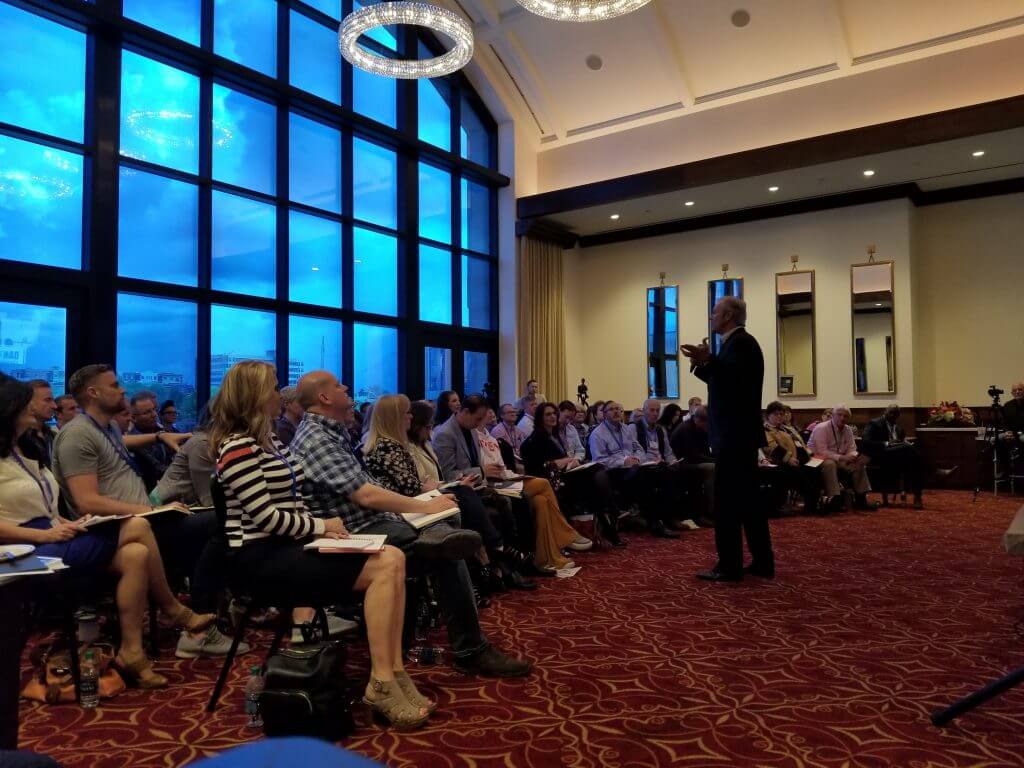Conversations about suicide prevention are complicated.
But conversation is critical…
In 2019 in the United States over 47,000 souls were lost to suicide, and an astonishing 1.38 million attempted to end their own lives.
Clearly, we have to keep talking.
As a life coach, I have challenging conversations with people on a daily basis.
As a father, husband, former professional athlete and motivational speaker, I’ve gained a perspective on suicide prevention and I’d like to share it with you…
If you, or someone you know, is considering suicide, please reach out to a resource like the National Suicide Prevention Hotline. I’ve included contact information at the end of this article.
Now, let me share my perspective…
Dealing with the seeds, not the fruit
Let me begin by sharing a fable.
A man had a dream where a genie appeared to him and explained that, because he had lived a noble life, he would grant him one wish.
The man thought for a moment and replied, “I wish that peace and love and prosperity and happiness fill the whole earth.”
The genie smiled and said, “That’s a wonderful wish sir, but we don’t deal in fruits here, we only deal in seeds.”
In any discussion – especially in this most important conversation about suicide prevention – we need to begin at the seed level.
And at the seed level, each of us who thinks we’ve hit “rock bottom” – which I prefer to define as hitting the rock foundation of our belief – must ask a series of questions in the mirror…
- Are your beliefs strong enough, deep enough, true enough to equip you, to empower you to persevere and respond to rapid, disruptive change?
- Do you understand that exhaustion is acceptable, failing is acceptable, throwing up is acceptable, crawling is acceptable, heart-break is acceptable?
- Do you believe that discouragement, disappointment and sadness are acceptable?
- Can you accept that complaining, blaming, whining and quitting are not?
Yes, that last question may sound harsh and callous, but, as Wayne Dyer said, “When we change the way we look at things, the things we look at change.”
Adjust your thinking…just buy an umbrella
The way we perceive the world around us is crucial to our pursuit of a significant life.
For example, one person can look out the window at the pouring rain and lament the terrible weather. Another can look out the window and be grateful for the nourishment the flowers and trees are getting from the rain.
The weather doesn’t change…we change how we perceive the weather.
Once we get ourselves right, the world becomes right.
Here are some more questions for you to consider…
How do you see the world right now?
How do you see yourself right now?
Are you a “glass is half full” or “glass is half empty” person?
If you gave any consideration to that last question you’ve missed the point!
The point? The glass is refillable!
The glass isn’t going to refill itself…
Thinking positively or thinking negatively doesn’t fill up your glass.
Pouring something in it does!
It’s easier to act our way into positive thinking than to think our way into positive action.
So, the seed level questions are, “where do you see yourself right now?” and “what direction do you want to go?”
Imagine ordering an Uber and giving them the wrong location. If you lie about where you are, the directions won’t work.
It’s the same with your life. You have to be honest.
Some of you have been clinically diagnosed with a chemical imbalance causing bipolar disorder, schizophrenia, depression and other mental illnesses.
If not, you know a loved one or friend who is struggling with some mental illness. And you’ve probably waded into conversations about suicide prevention.
Regardless of whether it is you, or someone you care about, it’s okay to need medication prescribed by a physician. You are worthy of non-judgmental friendship and unconditional love and support.
God bless each of you with the strength and confidence to overcome the social stigma of seeking help. You are not weak or unworthy.
In fact, nothing could be farther from the truth! You are the Strongest of the Strong because you knew to seek help.
I had a very personal experience with this myself…
Learning to separate “what you do” from “who you are”…
Here’s why I think the way I do today:
It was an American Football League tackling practice. My coach blew the whistle and yelled “Go!”…
My teammate and I ran full speed towards one another. It was a brutal head-on collision. I lay on the ground in shock. A sharp pain was shooting through my body.
I had compressed my neck, severed the ancillary nerve in my right deltoid, and suffered a grade-two concussion. My eye was drooping, my speech was slurred…
By nightfall, my neck was stiff, my right side was numb, the arm dangled uselessly at my side. I sweated and vomited and cried myself to sleep.
For the next fourteen months, I was paralyzed – both physically and emotionally. My heart was broken, and my dreams were shattered…my successful and promising life came crashing down.
I went to fifteen doctors who told me I’d never get better. And I believed them…
My life hit a fast-moving downward spiral until I thought I was depressed. But I wasn’t. I was actually just disappointed. And there’s a big difference.
I kept seeking help. The sixteenth doctor I consulted got me back on the road to recovery. I was able to regain my health…mentally and physically.
Now, when I’m speaking at conventions or working with leadership executives, I get asked three questions:
1. Why did I go to so many doctors?
The answer is, I kept going from doctor to doctor until I found someone who believed I could get better.
2. What took so long?
I was asking the wrong questions.
I was asking the doctors “how” I could get better when I should have been asking myself “why” I should recover. As soon as I answered the “why”, the “how” was clear and simple.
3. What was the secret to your resiliency?
The turning point was when my “why” became bigger than my “why not”…I realized I had been confusing who I was with what I did.
I thought I was a football player when in reality, that’s just what I did. Once I stopped focusing on chasing fame and fortune and started focusing on achieving my real purpose of becoming whole – living a life of significance – I was able to survive the pain of rehabilitation.
I started thinking of myself as a whole person.
Do you feel needed?
From 1983 to 1989, I was touring as a speaker on behalf of Nancy Reagan’s “Just Say No” message to young people. In those seven years, I spoke to over six million teenagers in thousands of schools in all 50 states.
During those same years, we also had a suicide epidemic sweeping across America. It affected every socioeconomic demographic in the country, from affluent areas to small mid-western towns.
A month before arriving at one of the schools, they had 100 suicide attempts. Tragically, one girl – the head cheerleader – died.
Most of them were on the honor roll. Six were elected student body officers, three were cheerleaders, three were football stars, and three were musicians. Each of them was getting attention and praise for their exceptional performances.
What did they share in common? They didn’t feel needed.
Despite being aware of their accomplishments and feeling recognized and celebrated…they didn’t feel necessary. They lacked “commitment relationships” in their lives.
Do you?
We think the three most important words someone can say to us are, “I love you” but, in fact, they are, “I need you”.
Do you feel needed? If not, why not?
We can’t afford to wait for someone else to tell us or show us that we are needed. It might never happen. Therefore, we must do something on a daily basis to prove to ourselves that we are needed.
If you don’t feel like you are genuinely needed by your spouse or significant other, you need to participate more and get involved with what matters most to them. If you don’t feel like you’re needed in your children’s lives, try carving out more time for them.
Feeling adrift in your community? Volunteer. Join a service club, coach youth sports, share your knowledge at workshops…
The onus is on you to engage.
There is always help and there is always hope
I guarantee if you become more engaged, you’ll find that you feel needed. Because you are!
You’ll find that you’ve become an expert in time management, your relationships are richer, and you’ll be on a path to living a life of significance.
Remember: Happily-ever-after is a day-at-a-time proposition. It won’t be overnight. But what you’ve been in the past doesn’t make you who you are today.
What you plan for your future makes you who you are today. So, do something today to prove to yourself that you are genuinely needed.
If you are struggling, contact the National Suicide Prevention Lifeline – Talk to Someone Now.


